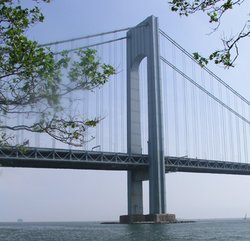Verrazano Narrows Bridge
|
|
Verrazano-Bridge-Dawn.jpg
The Verrazano Narrows Bridge (often written as the Verrazano-Narrows Bridge) is a suspension bridge that connects the boroughs of Staten Island and Brooklyn in New York City at the Narrows, the reach connecting the relatively protected upper bay and with the larger lower bay. The bridge is named for Italian explorer Giovanni da Verrazano, the first known European navigator to enter New York Harbor and the Hudson River. It has a center span of 1298 meters and was the largest suspension bridge in the world at the time of its completion in 1964 (it is now the seventh longest). The bridge furnishes a critical link in the local and regional highway system. It is widely known today as the starting point of the New York City Marathon. Among local residents it is often referred to as the "Verrazano Bridge" or simply "the Verrazano".
| Contents |
History
The bridge is owned by the City of New York and operated by the Triborough Bridge and Tunnel Authority, an affiliate agency of the Metropolitan Transportation Authority (New York). Interstate 278 passes over the Bridge connecting the Staten Island Expressway with the Brooklyn Queens Expressway.
Verrazano_Narrows_Bridge_from_Ferry_600.jpg
The bridge was the last great public works project in New York City overseen by Robert Moses, the New York Parks Commissioner and head of the Triborough Bridge and Tunnel Authority, who had long desired the bridge as means of completing the freeway system which was itself largely the result of his efforts. The bridge was designed by Chief engineer Othmar Ammann, who also designed other major crossings of the Hudson River, including the George Washington Bridge, the Bronx-Whitestone Bridge, the Triboro Bridge and the Throgs Neck Bridge. It was his last project. Construction on the started on August 13, 1959 and the upper deck was opened on November 21, 1964 at a cost of over $320 million. New York City Mayor Robert F. Wagner cut the ribbon at the opening ceremony, which was attended by over 5,000 people. The lower deck opened on June 28, 1969. The bridge remained the longest suspension bridge in the world from 1964 until 1981 when it was eclipsed by the Humber Bridge in England.
Naming controversy
Concorde_under_Verrazano_Bridge.jpg
© 2004 Metropolitan Transportation Authority
The naming of the bridge for Verrazano was highly controversial at the time. It was first proposed in 1951 by the Italian Historical Society of America, when the bridge was in the planning stage. After the initial proposal was turned down by Moses, the Society undertook a public relations campaign to both re-establish the reputation of the largely-forgotten Verrazano and to promote the idea of naming the bridge for him. The promotional campaign was largely the effort of Society director John N. LaCorte, who in 1954 successfully lobbied New York governor W. Averell Harriman to proclaim April 17 (the anniversary of Verrazano's arrival in the harbor) as "Verrazano Day". Subsequent efforts by LaCorte resulted in similar proclamations by governors of states along the East Coast. After these successes, LaCorte approached the Triborough Bridge and Tunnel Authority again, but was turned down a second time. The manager of the authority, backed by Moses, stated that the name was too long and that he had never heard of Verrazano.
The Society later succeded in lobbying to get a bill introduced in the New York State Assembly that would name the bridge for the explorer. After the introduction of the bill, the Staten Island Chamber of Commerce joined the Society in promoting the name. The bill was signed into law in 1960 by Governor Nelson Rockefeller. Although the controversy seemed settled, the naming issue rose again in the last year of construction after the assassination of John F. Kennedy. A petition to name the bridge for Kennedy received thousands of signatures and threatened the naming for the explorer. In response, LaCorte contacted Attorney General Robert Kennedy, the president's brother, who told Lecorte that he would make sure the bridge would not be named for his brother.

Despite the success of LaCorte, the official name was widely ignored by local news outlets at the time of the dedication. Some radio announcers and newspapers omitted any reference to Verrazano, referring to the bridge as the "Narrows Bridge", or the "Brooklyn-Staten Island Bridge". The Society continued its lobbying efforts to promote the name in the following years until the name became firmly established.
Bridge usage
VerrazanoBoroughsSign.JPG
The one-way toll (paid westbound into Staten Island only) is $9 for cars (as of March 13, 2005). There is a reduced rate for Staten Island residents.
The bridge is featured prominently at the opening of the New York City Marathon, which begins in Staten Island near the approach to the bridge. Television coverage of the race often features dramatic aerial views of the huge crowd of runners crossing the upper deck of the bridge. The bridge also was featured in the 1977 movie Saturday Night Fever, in which Tony Manero, played by John Travolta, climbs along the bridge's parapets in front of his friends from Bay Ridge, Brooklyn.
External links
- New York City MTA official site (http://www.mta.nyc.ny.us/bandt/html/veraz.htm)
- USGS Geonames data (http://geonames.usgs.gov/pls/gnis/web_query.GetDetail?tab=Y&id=968511)
- nycroads.com (http://www.nycroads.com/crossings/verrazano-narrows/)
- The Naming of the Verrazano (http://www.italianhistorical.org/VerrazzanoBridgeStory.htm)
- WYNC: Verrazano Bridge turns 40 (http://www.wnyc.org/news/articles/40927)de:Verrazano-Narrows-Brücke
